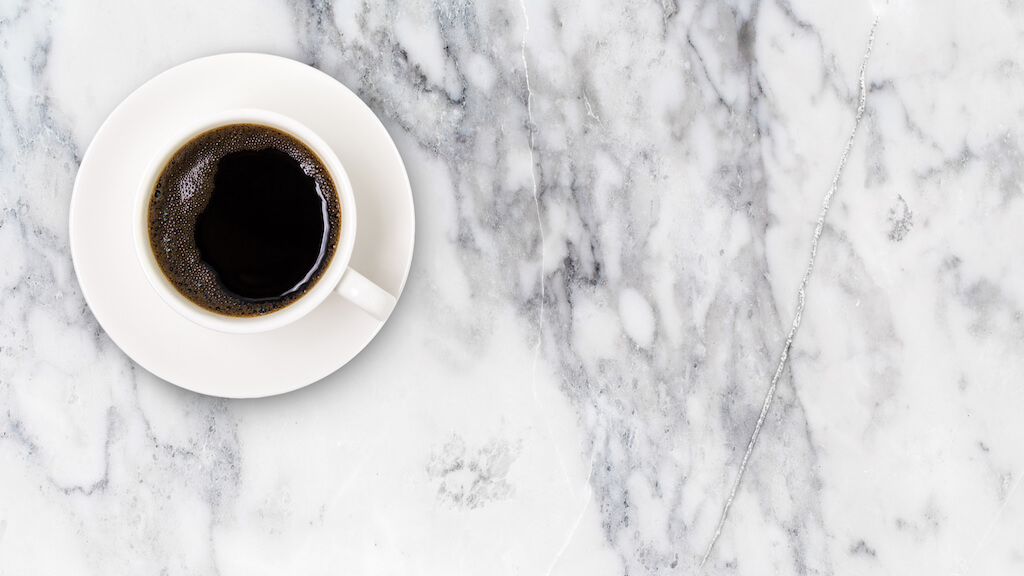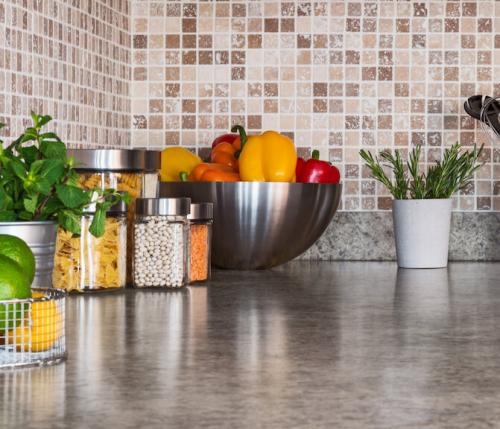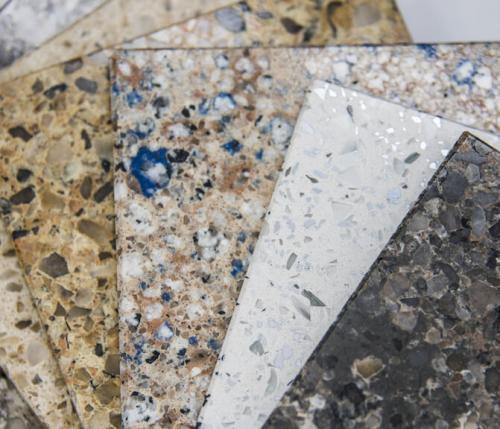When picking a countertop material obviously the natural stone is something that a shopper will gravitate towards. Things like granite and marble have a staying power both in durability and style that have lasted the test of time. Here we’re taking 5 of the most popular choices of natural stone and ranking them based on popularity, we’ll give you some pros and cons of each just so you’re in the know before making that purchase.
Granite
Granite is a wildly popular choice for counters. Due to its natural ability to resist heat, scratches, and cuts it makes for a good material for high traffic kitchens. The price tag that comes with granite though can be too much for some homeowners. Each slab of granite is unique in color, veining, and overall pattern which can make a stunning impact on the look of a kitchen! Like most other natural stone options, granite needs to be sealed to maintain a non-porous effect and be as long lasting as possible. It is a very durable substance though and is not easily chipped or damaged, making it a good option for a house filled with children. One con of granite is that most often there will be seams within the countertop unlike a man-made material, natural stones have size limitations on the slab and depending on the area of the counter a seam will most likely be involved.
Marble
Arguably the most elegant choice for counters, marble. This stone is a great option in many respects. The look and feel of a kitchen with marble counters is elegant, timeless, bright and usually striking as marble can come in many different shades and veining patterns. Marble is an ideal choice for any baker or pastry chef as it does not conduct heat very well and stays cool, making the dough-work very easy. Also marble is a very common amongst stoneworkers so finding it is an easy task. However, due to the porous nature it can stain quite easily, and again sealing and choosing an appropriate finish can help to prevent long lasting stains but leaving a lemon on a marble counter overnight can cause permanent damage. Also scratching, marble is not as hard as granite and can show scratches and nicks easier. If you like the worn down look and don’t want stark, sterile looking counters marble might be perfect for you! For more information, please visit slab market.
Ranking the Top 5 Natural Stone Countertop Materials
Pros and cons to help you making the right decision for your home
Limestone
Limestone is a unique option that should be considered if you use your kitchen as it’s intended. A stone option that can resist heat and can be sanded down when nicked or slightly damaged. Limestone needs a sealant as most other natural stone does because it is porous to liquid and can harbor bacteria if not properly cleaned, but it will add a cool modern look to a kitchen when used for the counter. It has a very light veining and usually stays cool even in hot weather. An economical option as well when put in relation to marble and granite, limestone usually comes in a tile form or slabs.
Limestone can react to anything acidic and stain very easily if not cared for properly so it’s advised to have the counters sealed twice per year in order to be protected. Use coasters, trays and other means of protection against exposure to such chemicals and you should be able to maintain the beautiful look and feel of your counters!
Soapstone
Another great option! Soapstone is a natural stone choice that has many benefits. It’s natural and can be just as varied in looks as granite or marble with color, veining, etc. However, unlink granite soapstone is not porous so it won’t stain or harbor bacteria making it very easy to clean and day-to-day care is very simple. It’s also much softer and more pliable than granite making it less prone to cracking and breaking over time which makes soapstone a material that quite literally lasts, some soapstone counters from the 1800s are still in use today! The heat resistance also makes soapstone an attractive option there is almost no way of burning or leaving a heat mark on the counter!
Because soapstone is a little bit soft it is prone to scuffing and if the stone is not finished smoothly it can scratch china and glassware so be wary when choosing a slab finish that it’s one that can accommodate how you use your kitchen!
Travertine
Travertine is a beautiful stone in the limestone family. It is naturally occurring and available is a variety of Earthy tone shades which add a subtle elegant vibe to any kitchen. Travertine can be installed as a slab but more commonly as tiles. It’s a very easy material to work with as it is heavy, and can be cut very easily to fit just about anywhere. It is also very easy to repair and replace in case of cracking, scratching, or any breakage. This is also a stone that needs to be sealed yearly to retain the original look and feel as it will stain if not taken care of. It is porous and can crack or scratch if not looked after. Travertine also reacts with acidic agents and depending on your cleaning materials should be considered when installing a travertine counter. However, the look and feel that travertine gives is classic and will last as long as your home, after all they did use travertine all over when building Rome!
There you have it, the top 5 natural stone options for counters. This list has been researched and thoroughly examined to hopefully give you some insight while doing your home renovation. Counters can be a huge investment depending on the stone choice, the square footage and the look of your home. It can be a huge selling point or really detract depending on how it’s done, proper research is necessary so talk with your industry experts online and in store about what’s best for your home and area before making a final decision.




 Workspace Design Show: 2024 UK Edition
Workspace Design Show: 2024 UK Edition  Open-air elegance: Claudio Bellini x Higold, the symphony of outdoor design
Open-air elegance: Claudio Bellini x Higold, the symphony of outdoor design  A stylish oasis for outdoor spaces
A stylish oasis for outdoor spaces  How to capture your property's best features
How to capture your property's best features